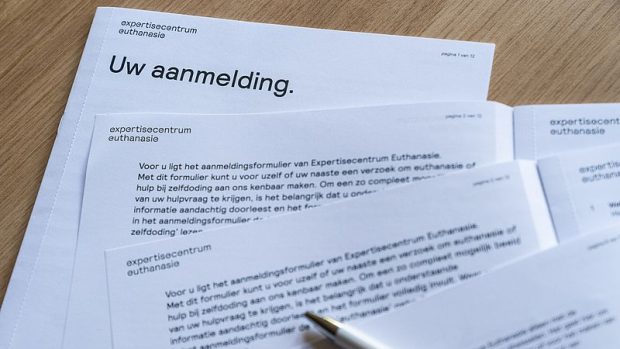January 5, 2025
Young women & Euthanasia in the NL
Young women who request euthanasia in the Netherlands often have a long history in youth care and mental health services according to new research by suicide prevention group ‘113′ and the ‘Euthanasia Expertise Centre’ (the group which advises on euthanasia requests).

A Euthanasia Expertise Centre application form
397 euthanasia requests from young people
Three per cent of all requests made during the study period by young people up to 24 years old to the Euthanasia Expertise Centre (the centre which handles ‘difficult’ requests). There were a total of 397 euthanasia requests from young people under 24 due to mental suffering.
This study only covers requests that came in to the Euthanasia Expertise Centre. The study by 113 Suicide Prevention and the Expertise Centre was published yesterday in an International Journal of Psychiatry.
Half requests withdrawn
The same study showed that more than half (47 per cent) of young people withdrew the euthanasia request themselves. And 45 per cent of the requests were rejected because they did not meet the legal conditions for euthanasia.
This is the first study to provide a picture of young peoples’ requests euthanasia because of mental suffering. It also shows what ultimately happens to the requests.
Mainly young women
Researcher Lizanne Schweren at 113 Suicide Prevention analysed young people’s euthanasia requests. ‘The group consists mainly of young women. You often see that they got into psychiatry at a very young age, around 11 years old on average.’
Schweren continues: ‘Without exception, they have been hospitalised. Almost all of them also had compulsory admissions and crisis admissions. So those are intense stories.’
Previously labelled ‘out of treatment’
The difference between the number of young women and young men who report to the Euthanasia Expertise Centre is striking.
According to Schweren, this is partly explained by the fact that women seek help more often and earlier than men. As a result, they are more likely to be known to the mental health services, and are also more likely to be labelled ‘out of treatment’.
‘Confronting conclusion’
‘Young men often enter care a bit later and maybe talk less about their problems. Then you are not out of treatment before the age of 24,’ says the researcher.
There is also another, confronting conclusion to be drawn, according to Schweren: ‘We observe that there is a group of women we cannot help, not in the mental health system, not outside the mental health system, not as a society.’ These women see no other way out than euthanasia.
‘I’m not going to do it anyway’
Yet few cases actually come to euthanasia. In fact, half of young people withdraw the request again. Sometimes at the very beginning of the process, sometimes at a later stage. ‘It also happens that people who get the call that it’s their turn say: ‘Oh, was I still on the waiting list? But I’m doing really well now. Take me off,‘’ Schweren says.
‘There are also people who have already gone through a whole process with the team of psychiatrists and nurses at the centre of expertise, and who, as a result, think: ‘I’m not going to do it after all.’ Who change their minds.’
‘Talking about it gives relief’
Schweren suspects this has to do with the fact that talking about a death wish can already give a lot of relief. ‘There is a huge need among young people who have a death wish to talk about it,’ he says.
‘Often they don’t succeed, it is difficult to discuss it with their own practitioners or they can’t get out of it. And they feel they have nowhere else to turn but to the Euthanasia Expertise Centre.’
Many requests rejected
Many requests are also rejected by the expertise centre, Schweren says.
‘Almost always this is because there are still possibilities for alternative treatment. Or because the doctor still sees hope. Or sees something that can still be tried. There are very few cases of young people where nothing more is really possible.’
This study looked at euthanasia requests between 2012 and 2021, since which time the Expertise Centre has seen an increase in requests by young people due to psychological suffering.